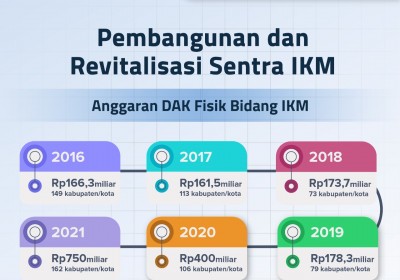The Challenge of Building and Revitalizing IKM Centers
September 23, 2021
JAKARTA – The Small-to-Medium Scale Industries (IKM) sector plays an important contributing role towards improving the level of public welfare and also economic growth. To accommodate the development of the domestic IKM sector, one of the efforts, among others, is through the development of IKM centers that can house a group of business units which produce similar products, use similar raw materials and carry out similar production processes.
"Through the construction and development of these IKM centers, it is hoped that the guidance, empowerment and capacity building of the IKMs can be carried out more effectively, efficiently and optimally," said the Industry Ministry's (Kemenperin) inspector general Masrokhan in a written statement on Tuesday (8/31).
Some of the main challenges in developing IKM centers are the lack of infrastructure, weak legal aspect and the lack of IKMs being housed in these centers. To tackle these issues, the Kemenperin's directorate general for small, medium and miscellaneous (IKMA) industries have allocated funds through its special IKM Center Development and Revitalization Program special allocation fund (DAK).
"Even though the Covid-19 pandemic greatly affected the national economy overall, this program was able to still carry out its duties from 2020 to 2021, with its funds gradually increasing significantly from previous years," the inspector general said.
In 2016, the special allocation fund managed to distribute up to Rp 166.3 billion for 149 regencies and cities. In 2017, Rp 161.5 billion was allocated for 113 regencies and cities. In 2018, the funds reached Rp 178.3 billion for 73 regencies and cities and in 2019, those numbers rose to Rp 178.3 billion for 79 locations. Meanwhile in 2020, up to Rp 400 billion was allocated to 106 locations and in 2021, the figure rose higher to Rp 750 billion to 162 locations.
Through this revitalization program, IKM centers across Indonesia are hoped to grow and contribute greatly to economic recovery and the IKM sector greatly affected by the pandemic. "To account for the amount of state funds allocated, it is also important to carry out ongoing assessments and evaluations on the effectiveness of this fund implementation for the IKM sector," Masrokhan added.
Through this monitoring and evaluation activities by the Kemenperin, the special IKM fund allocation program will still be able to meet the performance targets set, including the operation of IKM centers, compliance with regulations and the sustainable use of IKM centers, either new or revitalized.
"Therefore, it is hoped that the results of the implementation of the fund allocation program will be able to effectively and sustainably support the development of IKMs across Indonesia and to move the economic leverage of the surrounding areas and support the progress of the national economy," Masrokhan remarked.
Indonesia’s Research Institutions Supporting the Development of the Electric Vehicle Industry
Indonesian Muslim Fashion and Cosmetics IKMs Shine at Dubai World Expo 2020
Govt Steps Up UMKM Transformation Efforts in the Midst of Pandemic Slowdown
Govt Encourages Promotion of IKM Products in Digital Era
Government Begins Developing Maritime Training Center in Makassar
Tweets by IDDevForum
